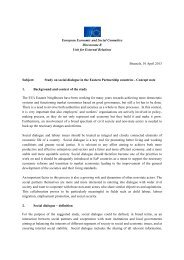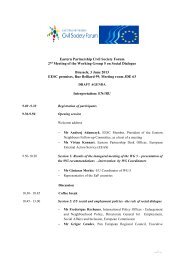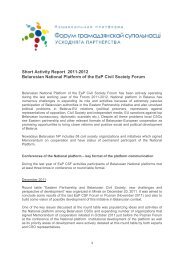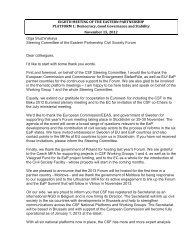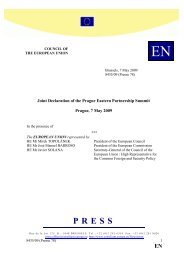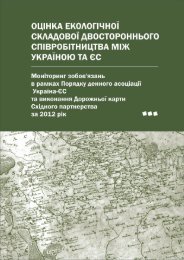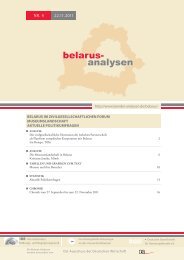Non-formal education - Eastern Partnership Civil Society Forum
Non-formal education - Eastern Partnership Civil Society Forum
Non-formal education - Eastern Partnership Civil Society Forum
You also want an ePaper? Increase the reach of your titles
YUMPU automatically turns print PDFs into web optimized ePapers that Google loves.
elationship between the political and <strong>education</strong>al changes in the Ukrainian society. A political crisis in<br />
the country often determines the emphasis on <strong>education</strong> reform for all or most of the political forces in<br />
the country.<br />
But the opportunities that are available in Ukraine in all-European and wider global <strong>education</strong>al<br />
process, increased mobility of pupils, students and teachers, the gradual change of the system of<br />
administration of <strong>education</strong>al institutions and the <strong>education</strong> system as a whole, defines new challenges<br />
for Ukraine, which the Ukrainian society needs first of all.<br />
Prerequisites for non-<strong>formal</strong> <strong>education</strong> in Ukraine<br />
<strong>Non</strong>-<strong>formal</strong> <strong>education</strong> as the segment of <strong>education</strong>al rights in Ukraine isn’t a new phenomenon, if<br />
we take into account cultural and social traditions in the progress of society (from tutors to practicing<br />
teachers). Modern social and economic situation requires the qualified and institutional acknowledgement<br />
of knowledge and skills, receiving by a person and required by a labor market. This is the urgent problem<br />
for young people without necessary work experience.<br />
Modern social and economic situation in Ukraine isn’t characterized only with the world-spread<br />
social and economic crisis. First of all, this is a change of the traditional lifestyle, including work and<br />
interpersonal relations, state organizations and institutes, connected to the work of big enterprises<br />
(factories and plants), etc. Modern social and economic dynamism and mobility demand entirely<br />
different qualities of personality: not diligence, but creativeness, strongly marked leadership ability, the<br />
skill to master new technologies in short time and so on.<br />
The system of <strong>formal</strong> <strong>education</strong> is the sufficiently conservative phenomenon, requiring a long time<br />
and a lot of efforts to be reformed. Long-term problems with enactment of a law about high <strong>education</strong><br />
in Ukraine can be the glaring example for it.<br />
<strong>Non</strong>-<strong>formal</strong> <strong>education</strong> (NFE) as the mechanism and the instrument of <strong>education</strong>al system is<br />
considerably dynamic, providing the invariance in <strong>education</strong> requirements of the society in general and<br />
certain individuals particularly. NFE offers opportunities both to solve short-term tasks (for example,<br />
the acquiring certain habits and competences) and support prospects of forming world-view personal<br />
knowledge (for example, the development of leadership ability or legal <strong>education</strong>).<br />
A new generation of teachers, tutors, coaches, well-informed about new teaching methods and<br />
skilled in the new approaches to <strong>education</strong>al process, was formed for the last decade; they can lead<br />
to the conflict with traditional methods. So the non-<strong>formal</strong> <strong>education</strong> becomes the optimal sphere for<br />
providing needs both for those, who teach and those, who wish to study.<br />
Legislation framework<br />
The functioning of the modern Ukrainian <strong>education</strong>al system is regulated by the different normative<br />
legal documents, such as: Constitution of Ukraine, the Law of Ukraine “On Education”, the Law of Ukraine<br />
“On Secondary Education“, the Conception of Secondary Education in Ukraine, “Provision of Ministry<br />
of <strong>education</strong> of Ukraine “On secondary comprehensive <strong>education</strong>al establishment”, “On Experimental<br />
Educational Platform” etc. The main trends of content, methods and forms of modernization of training<br />
and the main points of school and university management are defined in these acts. There are also<br />
two valuable documents except the mentioned ones: State national program “Education. Ukraine of<br />
the XXI century”, which was established by the resolution of the Cabinet of Ministers of Ukraine № 896<br />
from 3.10.1993 and National doctrine of <strong>education</strong>al development, established by the resolution of the<br />
President of Ukraine from 17.04.2002.<br />
The Ukrainian <strong>education</strong>al system includes (according to the 29th article of Law of Ukraine On Education):<br />
preschool <strong>education</strong>, secondary <strong>education</strong>, extra-school <strong>education</strong>, vocational <strong>education</strong>, higher <strong>education</strong>,<br />
ex-degree <strong>education</strong>, post-graduate course, institution of doctoral candidacy, self-<strong>education</strong>.<br />
So we can make a conclusion that the conception of “self-<strong>education</strong>”, which could, more or less,<br />
correlates with the meaning of non-<strong>formal</strong> and in<strong>formal</strong> <strong>education</strong>, is defined and presented in the<br />
Law. The Article № 49 of the same Law is read as follows: “With the aim to develop the citizens’ self<strong>education</strong><br />
open and public universities, lecture centers, libraries, different centers, clubs, broadcast<br />
<strong>education</strong>al programs etc. are created by the state structures, enterprises, institutions, organizations<br />
and citizens.”<br />
75






